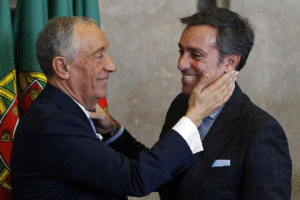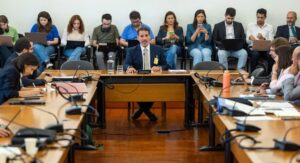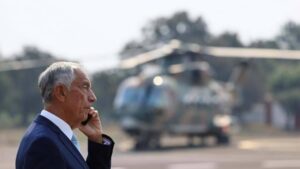Marcelo’s words come as US counterpart due to speak directly with Putin
Just as the world waits to hear the kind of peace Donald Trump accepts for Ukraine following his telephone conversation today with Russian counterpart Vladimir Putin, Portugal’s own president Marcelo Rebelo de Sousa has been arguing in Slovenia that the US should guarantee “the durability of the solution that is reached”, ie, it must be involved in assuring Ukraine’s security.
What effect this position has (if any) is the big question.
Speaking to journalists in Ljubljana after a meeting with the Portuguese community in Slovenia yesterday, during which he stressed that both EU countries think “exactly the same way” about the defence of Ukraine in the face of Russia’s invasion, he said they do not want to see “an illusory peace” – something that many bystanders fear is exactly what will be emerging.
Marcelo referred to the fact that “here (in Slovenia)” the desire for a peace agreement “that truly creates lasting conditions and is sustainable” is “felt more, because we are further east, and so closer to Russia, and to Ukraine.
“But for the whole of Europe, it is fundamental that this peace is a peace; that it isn’t an interval between two wars, and a very short and very short-lived interval at that (…) That is what is being discussed, and that is what everyone wants”.
Regarding the role of the US, de Sousa pointed out that the European position is “to be open to everything that is a manifestation of the goodwill of the US and to consider it essential that the US gets involved in the peace solution” – explaining that this means helping to provide guarantees for Ukraine.
“Getting involved isn’t just about taking initiatives at a certain moment; it is about guaranteeing Ukraine’s security and the durability of the peace solution that is reached,” he reiterated.
Concluding his thoughts, the Portuguese president once again expressed the hope that “Europe will not be omitted, will not be forgotten in what is fundamental” in the ongoing negotiations for a peace agreement, “because this concerns the security of the continent.”
The UK government said on Monday that an estimated 30 countries are expected to take part in the peacekeeping force in Ukraine that Paris and London are trying to form in anticipation of a ceasefire.
“We expect more than 30 countries to be involved” in this coalition, with “a significant number of countries providing troops and a wider group (of countries) providing other contributions,” said a spokesman for British Prime Minister Keir Starmer, who organised a virtual meeting with around 25 of Ukraine’s allies last Saturday, attended by several European Union member states, including Portugal, as well as Canada, Australia and New Zealand.
The aim of this mooted peacekeeping force will be to dissuade Russia from violating a possible ceasefire if Moscow accepts the US proposal to which Kyiv has already agreed.
To date, Russia has been totally opposed to the presence in Ukraine of troops from other European countries, but as France’s President Macron has pointed out, Russia should not have any say in what happens on Ukraine’s sovereign territory.
Mr Macron has also recalled that Russia did not require any other countries’ permission to involve North Korean soldiers in his full-scale invasion, thus why would other countries require Russia’s permission for a force focused on keeping the peace. ND
Source material: LUSA




















